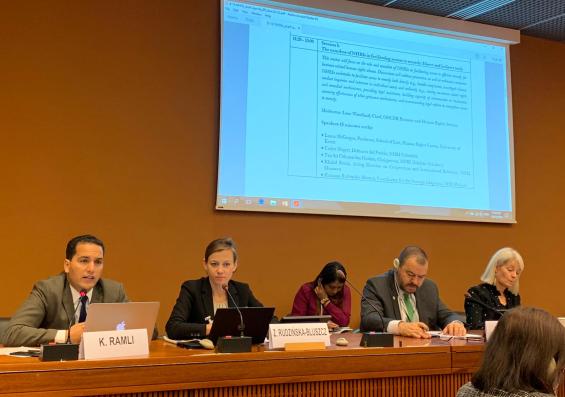Geneva: CNDH participates in the Global consultation on the role of NHRIs in facilitating access to remedy for business-related human rights abuses
The National Human Rights Council (CNDH) took part in the Global consultation on “the role of national human rights institutions (NHRIs) in facilitating access to remedy for business related human rights abuses” on 10 and 11 October 2019 at the Palais des Nations, Geneva.
NHRIs can play an important role in facilitating access to remedy for individuals and communities affected by human rights abuses, including those related to businesses. They can act as important bridge-builders between rights holders and the State, civil society and businesses.
However, the work of NHRIs is facing several challenges related to how to implement fully their recommendations, how their legal mandate can be reinforced and how they can be provided with adequate financial and human resources.
In his statement at this Global consultation, Khalid Ramli, Acting Director on Cooperation and International Relations at the CNDH, shed lights on the importance of building strong relationships with national authorities to overcome the challenges mentioned above.

Mr. Ramli clarified that strong and constructive relationships can contribute to overcoming these challenges, as parliaments are responsible for the elaboration of laws and NHRIs can inform legal processes. This can be done only through a rapprochement between NHRIs and Parliaments. There are international guidelines known as Belgrade Principles and NHRIs should build on these principles and develop tools to improve their engagement with Parliaments. In Morocco, the CNDH signed a memorandum of understanding with both chambers of the Parliament, which enabled it to influence legal frameworks.
Furthermore, he added that the government also set up a Moroccan National Contact Point (NCP) in 2014, whose chairmanship and secretariat are ensured by the Moroccan Investment Development Agency (AMDI). This NCP, composed of government departments and other institutions, including the CNDH, has the task of promoting the OECD Guidelines and has also a mandate to handle business-related complaints. In January 2018, the Moroccan government allocated a specific budget to the NCP for the first time. The CNDH actively participates in OECD forums and debates as a member of the Moroccan NCP.
Mr. Ramli also highlighted that the Government approved in February 2018 a recommendation of the CNDH and a measure in its Plan of Action on Democracy and Human Rights, which was developed in response to the Vienna Declaration and Program of Action. This plan includes a measure to draw up a national action plan on business and human rights, in compliance with the UN Guiding Principles on Business and Human Rights.
To be noted that CNDH chaired, from 2015 to 2018, the Working Group on Business and Human Rights of the Global Alliance of NHRIs (GANHRI ), which contributed to international processes in this area, including the drafting of a legally binding international instrument, the OHCHR's project on non-judicial remedy and accountability as well as the capacity building of NHRIs.






















